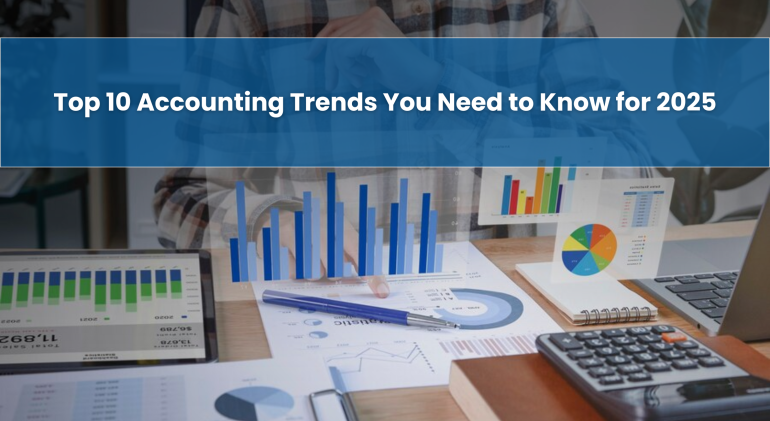
Top 10 Accounting Trends You Need to Know for 2025
AI and Automation have been game-changing for the accounting industry. Organizations in various sectors want to reach high-quality standards. They seek to do this with automation and strategic accounting support. Organizations now seek accounting firms that use advanced technology and specialized services. They want to partner with accounting firms offering outsourcing, consulting, and advanced tax and advisory services. These services will help organizations navigate complex financial outlooks.
Accounting trends and predictions for 2025 that will redefine how accounting outsourcing firms will deliver value to their clients:
1. Cloud-based Accounting:
Cloud technology has changed how organizations store, manage, and access data. Cloud technology gives real-time updates and better accessibility to users. It also improves collaboration across geographic boundaries.
Many organizations worldwide have been migrating to cloud-based accounting. Cloud-based accounting reduces an organization’s workload and helps in increasing profits. The long-term benefits of cloud accounting outweigh its short-term costs. Migrating to cloud accounting is easy as it integrates seamlessly with ERP software.
Key impacts:
- Real-time financial reporting.
- Improved business flexibility and scalability.
- Better accessibility to employees across the globe, including those in remote locations.
2. Blockchain Technology:
Blockchain technology will greatly impact the accounting world. It allows users to update and verify data without delay across various devices. This prevents data tampering. Each user has a copy of the ledger, and any changes are immediately visible to all users.
Blockchain technology stores all financials in an encrypted format. The financials cannot be easily modified. Thus, blockchain technology minimizes fraud. This technology can be used with accounting practices, especially financial reporting and auditing. Soon, the regulated finance and healthcare sectors will use blockchain technology extensively.
Key impacts:
- Improved security and transparency.
- Entrusted audit outcomes.
- Efficient reconciliation processes for accounting firms in the UK and globally.
3. AI and Automation:
Business organizations know that AI and automation will shape the future of accounting. AI works on data, and if organizations have good data, they can stay ahead of their competitors. AI handles huge volumes of data and information with speed and accuracy. It will revolutionize the way tax and advisory services are provided to organizations.
Using AI and accounting tools, organizations can align their finances and gain a competitive edge. AI can help organizations find trends, analyze data, and provide tax-saving solutions.
Key impacts:
- Comprehensive business strategies.
- Improved compliance and regulations.
- Enhanced and accurate advisory services in business strategy.
4. Virtual CFO Services:
The year 2025 will see a rise in small and mid-sized firms hiring virtual CFOs rather than having a full-time CFO. A virtual CFO provides expertise in finance, cash flow, and business growth. The virtual CFO offers specialized services at a lower cost compared to a full-time CFO. They can help small and medium-sized firms with their business plans at competitive rates.
Key impacts:
- Rise of virtual CFO roles.
- More demand for strategic financial and advisory services.
- Cost-effective financial leadership for forecasting, planning, and risk management.
5. Sustainability and ESG Reporting:
Sustainability accounting is a major focus area for businesses, investors, and regulators. The year 2025 will see a rise in Environmental, Social, and Governance (ESG) reporting. There is a high demand for transparent and accurate ESG reporting. Accountants and outsourcing firms can help organizations track, report, and audit non-financial metrics.
Key impacts:
- Enhanced regulatory compliance.
- Huge demand for accountants and financial experts with expertise in ESG metrics.
- Transition toward sustainable business practices.
6. Cybersecurity Measures:
Data security is always a great concern for all organizations. The ITRC Q3 2024 breach report says financial firms are most at risk, with 141 data compromises. Organizations must focus on data security.
Accounting firms providing services based on encryption, multi-factor authentication, and cloud platforms can help organizations protect their sensitive information. Organizations need to design high-end approval systems and train their staff about ongoing data threats.
Key impacts:
- Focus on data protection and security.
- Stringent cybersecurity protocols to protect client data.
- More trust and compliance in handling sensitive data.
7. Accounting in Healthcare Industries:
Healthcare services are now gaining utmost importance, especially post-corona. Healthcare industries are seeking firms that offer specialized accounting outsourcing solutions. These firms can better manage their complex finances. They are experts in Medicare, billing, and health care reimbursements. They also help in cost control and regulatory compliance.
Key impacts:
- Tailored accounting solutions for healthcare industry clients.
- Focus on compliance in the healthcare sector.
- Demand for financial expertise in reimbursement management and financial sustainability in healthcare.
8. Growth of Back-Office Accounting Services:
Organizations these days want to focus on their core competencies. They seek specialized accounting firms for daily accounting and bookkeeping activities. Back-office accounting services include bookkeeping, reporting, account reconciliation, payroll, and tax compliance.
Organizations can use AI and cloud accounting software to integrate these tasks with their internal systems. Back-office accounting services help organizations use their internal staff and resources better. Organizations can then focus on value-added activities and stay competitive in the global market.
Key impacts:
- Significant cost reductions for organizations.
- Focus on strategic growth for businesses.
- Better and more efficient financial operations, especially for small and medium-sized businesses.
9. Integration of Tax and Advisory services:
Tax laws are becoming more complex, especially with global regulatory shifts. Organizations need integrated tax and advisory services. They help them keep up with changing regulations. These services will help organizations align their tax strategies with their long-term goals. Accounting firms must provide integrated tax and advisory services. Factors like global expansion, mergers, acquisitions, and tax incentives require them. These firms help clients optimize their tax structures and reduce liabilities.
Key impacts:
- Improved compliance with tax regulations through automation.
- Data-driven tax strategies.
- Improved advisory capabilities in tax planning and business strategies.
10. Upskilling Accounting/Financial Professionals:
Organizations embracing new technologies need to upskill their accountants and financial professionals. Finance professionals need to possess skill sets that will further their careers. They need to be updated with the latest technologies such as ERP systems, BI software, and advanced modeling techniques.
Soft skills are intangible and include communication, client management, and problem-solving techniques. These skills along with the traditional accounting knowledge can make them more rounded to provide better client relationships and more value to the organization.
Key impacts:
- Leverage AI and automation capabilities.
- More emphasis on continued learning.
- New career opportunities in data analytics, financial technology, data, and cybersecurity.
Takeaway
The accounting industry is getting ready for a major transformation in the year 2025. Accounting firms must provide integrated solutions to their clients. These include accounting outsourcing solutions, back-office accounting services, management consulting, and tax and advisory services. The healthcare, banking, and financial sectors will benefit from their services ensuring compliance and financial stability.
In 2025, accounting firms embracing these trends can better serve their clients. Snap Digital Solutions is one such accounting firm offering high-end accounting solutions. Their accountants and financial professionals possess extensive qualifications and expertise. They are well-versed in the latest accounting technology. They are helping clients across the UK meet their financial goals.






